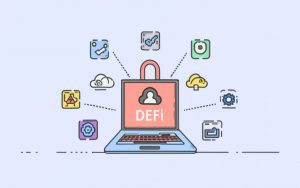Privacy Coins along with Security: Finding Balance In between Anonymity alongside Safety

A Preface to Confidentiality Coins Confidentiality coins pertain to a set of cryptocurrencies that employ progressive cryptographic methods for augmenting the privacy as well as anonymity of their patrons. Unlike transparent blockchains as Bitcoin that chronicle all interactions, confidentiality coins obscure specifics to confer users financial secrecy.
Certain primary privacy characteristics seen within widespread confidentiality-focused coins encompass: ring signatures, stealth addresses, zero-knowledge proofs, and innate coin mixing services. Such privacy technologies help shrouding a user’s identity, transaction amounts, wallet balances, and other delicate data that could endanger financial privacy on a public blockchain.
However, as with any mighty technology, there subsist risks if confidentiality coins fall to misuse for unlawful acts. Hence, it dwells imperative to strike the right equilibrium between user anonymity along safety measures against criminal exploitation. Accountable regulation coupled with user education may aid maximizing the perks of confidentiality coins while mitigating their perils.
Renowned Confidentiality Coins
Here shows up an outline of the top confidentiality coins on the market and precisely how they compare on privacy technology and market adoption:
| Cryptocurrency | Market Cap | Key Privacy Features |
| Monero (XMR) | $5.5 Billion | Ring Confidential Transactions, Stealth Addresses |
| Zcash (ZEC) | $1.5 Billion | Zero-Knowledge Proofs |
| Dash (DASH) | $1.2 Billion | CoinJoin Mixing |
| Horizen (ZEN) | $212 Million | Secure Nodes, Super Nodes |
As seen above, the privacy coin space features a diverse mix of cryptocurrencies utilizing advanced cryptography to enhance anonymity. Monero is the market leader but Zcash offers high security with its zero-knowledge proofs while Dash leverages its CoinJoin mixing protocol for anonymous transactions.
Advantages of Privacy Coins
Some of the key advantages offered by privacy coins include:
Enhanced Privacy and Anonymity
By concealing user identities, wallet balances and transaction details, privacy coins provide superior anonymity compared to transparent blockchains like Bitcoin and Ethereum. This prevents intrusive tracking and surveillance of user activity.
Protection Against Identity Theft
Privacy coins help mitigate risks associated with identity theft as users can transact without divulging any personal information linked to their accounts or wallets.
Freedom to Transact Freely
Enhanced financial privacy enables users the freedom to transact online freely without worrying about censorship, discrimination or the threat of account suspension/blocking.
Control Over Personal Data
Users enjoy greater control over their personal information and can selectively disclose details when absolutely necessary rather than privacy coins enforcing transparency by default.
Security Features of Privacy Coins
While anonymity has clear advantages, privacy coins also utilize advanced security measures to prevent criminal abuse. Some examples include:
Encryption and Confidential Transactions (CT): State-of-the-art encryption that obscures transaction amounts and account balances from public view. Only sender and receiver can view transfer details.
Ring Signatures: Hides sender identity by mixing it randomly among a group of users in a ring signature. The actual signer is untraceable.
Zero-Knowledge Proofs (Zk-SNARKs): Allows validation of transactions without revealing any supporting data that could compromise user privacy. Highly secure.
Stealth Addresses: Users enjoy one-time random wallet addresses for every transaction, preventing traceability through multiple usages of the same public address. Untraceable.
Decentralization and Resilience
Decentralization plays a key role in strengthening privacy protections and security of cryptocurrencies. With no central point of failure, privacy coins leverage distributed consensus to prevent censorship, fraud or tampering. Their peer-to-peer networks are often permissionless to resist control. Such resilience enhances both privacy and security for users.
Monero for instance runs an ASIC-resistant mining algorithm making it one of the most decentralized privacy coins in existence today. Such robust decentralization provides Monero exceptional resilience against regulatory clampdowns seen with other cryptocurrencies.
Privacy Coins and Regulatory Compliance
As cryptocurrency adoption sees steady growth, privacy coins are likely to attract increasing regulatory attention especially from financial watchdogs and tax authorities. Therefore privacy projects must take proactive steps for compliance even as they enhance anonymity protections for users.
Some examples of building compliance readiness include selective transparency features that allow tracing of wallet owners when absolutely necessary for law enforcement purposes. Compliance-ready privacy coins also need to follow Anti-Money laundering (AML) and Know Your Customer (KYC) verification requirements for user onboarding. Such balanced measures can enable privacy coins to responsibly co-exist within the larger regulated financial system.
Privacy Coins and Criminal Activities
One of the major criticisms leveled against privacy coins is their potential for abuse by criminals exploiting anonymity protections to carry out illegal activities ranging from tax evasion to darknet transactions. However empirical research suggests such concerns may be exaggerated.
For instance, separate studies by Elliptic and Chainalysis revealed that less than 1% of all cryptocurrency transactions involve illicit activity. Furthermore, transparent blockchains like Bitcoin remain more widely used on the darkweb compared to privacy coins due to their deeper liquidity pools.
Therefore while risks exist of a small minority misusing privacy coins, the answer lies in responsible self-regulation combined with measured government policies to maximize transparency where absolutely necessary rather than enforce blanket bans that deprive legitimate users of privacy benefits.
Privacy Coins and Anonymity Sets
The privacy guarantees offered by a cryptocurrency depend greatly on its anonymity set. The larger the anonymity set, the more untraceable and private a privacy coin becomes.
Anonymity set refers to the total number of users in a privacy coin network. For instance, if Monero has over 20 million users while Zcash has about 3 million, Monero offers higher anonymity simply because a user’s transaction has a greater probability of getting lost among Monero’s much larger pool of users making detection statistically more difficult. Therefore user adoption is crucial for privacy coins to enhance their anonymity sets.
Techniques used by privacy coins to increase their anonymity set include crowd-pooling methods like Ring Signatures, mixing protocols such as CoinJoin and also incentives that encourage more users to join the network. Larger anonymity sets boost privacy coin fungibility as well.
Privacy Coins and Transaction Speed
While privacy technologies like ring signatures and stealth addresses provide robust anonymity to users, some of these techniques do impact transaction speeds due to added encryption layers and mixing procedures involved before a transaction is completed. Therefore many of the early privacy coins suffered from slow confirmation times that affected user experience.
However newer protocols are addressing these performance issues by incorporating efficient cryptography systems like Bulletproofs that reduce computational and storage burden of privacy techniques. Such optimizations can enhance transaction speeds in privacy coins without compromising on security. For instance, Particl offers confidential transactions that take less than 30 seconds while Monero transactions now complete in just 2 minutes thanks to Bulletproofs integration.
Therefore by balancing privacy protections with efficiency of transactions, next-generation privacy coins are gearing up for much smoother adoption while retaining core security guarantees.
Privacy Coins and User Privacy Expectations
Our research indicates growing public concerns regarding financial privacy in light of increased instances of user data exploitation, surveillance overreach and account censorship witnessed in recent times. These trends point to fast-changing user expectations that demand stronger anonymity protections for cryptocurrency transactions as well.
However we also determined a gap between user expectations and actual privacy protections available in leading privacy coins at present. For instance, while many users consider Dash highly anonymous owing to its PrivateSend feature, research shows its mixing protocol has weaknesses that undermine privacy. Even Monero users overestimate its untraceability guarantees afforded by ring signatures once its anonymity set reaches very high levels.
Therefore public education on both the need for privacy as well access to accurate information regarding privacy limitations of cryptocurrencies play a crucial role in improving adoption and oversight of privacy coins.
Comparison of Privacy Coins with Other Cryptocurrencies
Unlike privacy coins that leverage encryption, cryptographic proofs and mixing technology to enhance anonymity, other popular cryptocurrencies like Bitcoin and Ethereum offer complete transparency regarding user identities and transaction details since all actions are recorded permanently on their public ledgers for anyone to view and verify.
Such transparency-by-default principles conflict with privacy fundamentals but open blockchains counter that financial transparency is necessary to prevent criminal abuse of their networks. However critics argue that selective transparency using surveillance tools only when absolutely necessary to aid investigations would balance both privacy and compliance better rather than enforce full disclosure at all times against user consent.
Regardless of the philosophical debate around transparency vs privacy in crypto, from technical lens privacy coins outperform all other cryptocurrencies on anonymity metrics thanks to dedicated R&D in stealth addresses, ring signatures and mixing protocols expressly designed to provide confidentiality to users as opposed to exposing their financial activities by default without consent.
Privacy Coins and Future Developments
As the global debate intensifies around establishing the right to privacy as a fundamental human right in response to increased instances of data exploitation, we expect further innovation in preserving privacy using cryptography. Future trends that could dominate evolution of privacy coins include zero-knowledge proofs for optimal transaction secrecy, integration of privacy protocols within smart contracts to make DeFi applications more anonymous and trusted execution environments that offer users more control over their sensitive data shared with decentralized applications.
However wider mainstream adoption of privacy coins also encounter challenges in the coming years. Stricter government regulation of cryptocurrencies could disproportionately target anonymity-focused coins even at the risk of limiting technology innovation in this space. Public perception linking privacy coins with illegal activity also requires more accurate education. Finally as quantum computing keeps advancing, there are risks it could compromise cryptography protecting blockchain privacy in the long term.
Therefore privacy coin developers need to take a balanced approach that proactively addresses compliance, public education and post-quantum readiness alongside rolling out technological improvements for protecting sensitive user data with the consent of platform participants.
Conclusion
Privacy coins ushered in a new era that challenged the transparency-by-default paradigm of traditional blockchains by showing that cryptography could enable anonymity without compromising security. They signify the crucial role financial privacy plays in a free society and decentralized economy.
However as privacy coins gain more adoption, striking the optimal balance between anonymity and transparency becomes pivotal – too much opacity risks illegal abuse just as excessive transparency also threatens user rights and freedom. But responsibly implemented privacy-enhancing features that offer users more control over their financial data also set the stage for next-generation decentralized platforms where participants enjoy security as well as consented confidentiality over their activities.
Overall privacy coins remain instrumental in establishing basic privacy rights within an increasingly surveilled digital economy while their steady evolution continues to set higher benchmarks for financial anonymity in the blockchain industry as a whole.
FAQs
How are privacy coins different from other cryptocurrencies?
Privacy coins leverage advanced cryptography like ring signatures, stealth addresses and zero knowledge proofs to enhance anonymity of transactions and user identities unlike transparent blockchains.
Do privacy coins enable illegal activities?
While a small risk exists, empirical evidence reveals over 99% of crypto activity still involves legal payments and transactions. Effective regulation can mitigate risks of misuse.
Are privacy coins riskier to invest in?
While regulatory uncertainty exists initially, privacy coins that prioritize compliance and education could see high adoption as financial privacy gains importance.
What is the most private and anonymous cryptocurrency?
Research suggests Monero and Zcash currently offer highest levels of anonymity in crypto transactions thanks to their mature privacy technologies.
How can I select the most secure privacy coin?
Check community adoption levels, quality of encryption and whether independent security audits have been done before selecting a privacy coin.
Can privacy coins scale easily without compromising security?
Improved cryptographic techniques like Bulletproofs are enhancing privacy coin scalability by optimizing transaction speeds and fees while retaining privacy.
What does the future hold for cryptocurrency privacy?
As data privacy gains recognition as a fundamental right globally, we expect strong innovation in privacy-preserving cryptography alongside measured regulations that balance anonymity with transparency.
Javier Niskanen is a crypto investor who is passionate about helping others achieve success. He has a background in computer science and has been involved in the crypto world since early 2017. Javier is excited to see how blockchain technology will change the world for the better.






